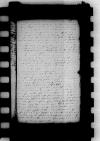Letter #1762
Ioannes DANTISCUS to [Tiedemann GIESE]Löbau (Lubawa), 1537-11-03
English register: Dantiscus informs Giese about the visit to Lubawa of Hermann Bremer, plenipotentiary of Maurycy Ferber’s heirs, who tried to persuade Dantiscus to agree to Johann von Werden’s wishes. Having been refused, Bremer returned to Przezmark, taking Dantiscus’ letter to the testamentary executors with him. Dantiscus encloses a copy of this letter so that Giese and his colleagues (the Warmia canons) will know what line of conduct to take. Dantiscus also informs him that the letter received from Johann von Werden (letter from Przezmark, October 31, 1537) contains no reaction to Dantiscus’ decision sent through Hermann Bremer. Giese’s brother, who brought Dantiscus Werden’s letter, has left Dantiscus 1000 Hungarian florins and is returning to Przezmark today. Dantiscus is sending Giese a copy of the reply to the letter sent by the Prussian Council from Grudziądz to the king. He also encloses letters received from the Cracow bishop and Nipszyc. Dantiscus informs Giese that following the talks Dantiscus’ brother Bernard (von Höfen) held with Iacobus (Ludovicus Decius), it has been decided that the money will be transferred to Rome through the Fuggers’ bank for security reasons. As soon as he gets well, Bernard will deliver the money to Iacobus in Toruń, and then leave immediately for Cracow to hold talks with Georg Hegel on this matter. He will also make sure that, if the Grand Chancellor (Jan Chojeński) goes to the Roman king (Ferdinand I Habsburg) on a mission, the Vice-Chancellor (Paweł Wolski) will post the king’s letter to the pope, written by Giese. Postscript: Dantiscus informs Giese that he has posted a reply to the congratulatory letter to them both, personally written and sent to them by Duke Albrecht. He encourages Giese to reply to Albrecht as well.
Manuscript sources:
Prints:
| ||||||||||||||
Text & apparatus & commentary Plain text Text & commentary Text & apparatus
Reverendissime Domine, Frater et Amice carissime ac honoran(de) or honoran(dissime)⌈honoran(de)honoran(de) or honoran(dissime)⌉. Salutem et fraterni amoris commendationem.
Post abitum
ms 1 moliancium,
ms 2 3 4 moliamur⌈molianturmoliantur,
ms 1 moliancium,
ms 2 3 4 moliamur⌉ experiemur brevi. Hodie hinc Dominationis Vestrae
Reverendissimae frater[4] ad
ms 1 anthematis et,
ms 2 3 4 omitted⌈exanthematis etexanthematis et,
ms 1 anthematis et,
ms 2 3 4 omitted⌉
pusulis or papulis,
ms 1 2 3 4 pupulis⌈pusulispusulis or papulis,
ms 1 2 3 4 pupulis⌉ erupit, habuerit, {ut} pecuniis nostris
Reverendissimae Dominationis Vestrae integerrimus ms. integerimus(!)
⌈integerrimusintegerrimus ms. integerimus(!)
⌉ frater
 BCz, 244, p. 282
BCz, 244, p. 282
Postscript:
Quibus modis nobis utrisque
